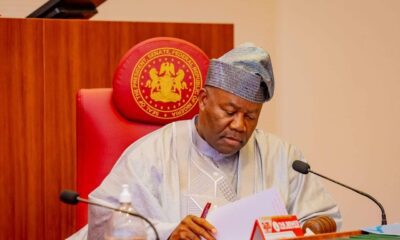Economic Issues
Challenges and Economic Potentials of Nigeria’s Tourism Sector in Post-COVID-19 Era -By Daniel Uchechukwu Lawrence

The economic potentials of tourism remain enormous as the sector generate billions of dollars yearly for nations across the globe. For this reason, many countries have anchored their economic growth and survival on the development of their tourism and hospitality industry. In 2018, international tourist arrivals reached 1.4 billion, while total export earnings from international tourism reached USD 1.7 trillion, or almost USD 5 billion per day on average (United Nations World Tourism Organization, 2019). There is no doubt that every nation possesses one tourism potential or the other by the virtue of their culture, tradition, environment, and history. Given the enormous economic benefits of tourism, countries such as Australia, Germany, the United States of America, China, the Caribbean, Spain, United Arab Emirates, among others have taken advantage of the prosperous opportunities the sector offers to expand their national income and diversify their economies.
The mother land of Africa is home to beautiful landscapes and vegetations, wildlife, historical sites and rich cultural festivals. These natural attributes have become huge sources of tourist attraction to the continent. Given these nature’s gift to the continent, countries such as Burundi, South Africa, Kenya, Gambia, Tunisia, Morocco, Ethiopia, and Egypt are among the lead nations in the tourism business on the continent and at the global stage, considering the significant contribution of the sector to their various national economies. In 2019, Kenya which is the continent’s leading tourism country, recorded a significant economic increase of 3.6 percent in her tourism earnings. This saw the country raking in about USD 1.6 billion from 2,048,834 foreign visitors (East African, 2020).
Like her other counterparts in Africa, Nigeria possesses huge tourism potentials that have the capacity to boost and transform her national economy. Natural sites, historical routes and arts to the nation include; the Atlantic Ocean beaches, mangrove forest in the south and mountainous valleys and Sahel that serves as habitat to various species of wildlife, rock formations, caves and waterfalls. Slaves routes in West Africa during the 16th and 18th centuries for the shipment of black slaves to Europe and America, national game reserves and wetlands, traditional arts and grafts, national monuments, sites and museums, historical events, cultural and traditional festivals. Eneji et al (2016) maintained that Nigeria’s tourism landscape is extremely rich and beautiful for global tourist attraction. The weather, climate, vegetation, quality airspace, sunshine, beautiful scenery, the rocks, water falls, captivating beaches, historical relics, rich cultural diversity, friendly peoples and wildlife are Nigeria’s tourism assets (Eneji, et al 2016). Corroborating to this, Njoku (2019), stated that “Nigeria is the most populated country in Africa and has become an untapped tourist paradise with long stretches of exotic beaches, lush mountains, well-preserved tradition and culture and enchanting attractions that draw tourists from different parts of the world”.
In another contribution, Bankole (2013) argued that some physical representations of Nigeria’s cultural heritage include palaces, architecturally sophisticated and unique city walls and gates, shrines, smelting furnaces, arts and crafts, pottery making, traditional foods and drinks. According to him, in the pre-colonial Nigeria, religious ceremonies and ritual practices played very significant role in inspiring those creative works usually classified as “arts” while those objects made to serve functional purposes are classified as “crafts‟. These arts and crafts were able to flourish in the pre-colonial era because of the significant roles they play in both the secular and religious life of the Nigerian people at the time. Some of the arts and grafts represented important traditional occasions such as birth, puberty, marriage, and death. It was, however, a major setback for the societies within the territory that subsequently formed the modern Nigeria for the loss of substantial aspects of their cultural heritage to the foreign powers, particularly in the looting that characterized the colonial period (Bankole, 2013). With different tourist attractions across the 36 federating states of Nigeria and the federal capital territory, one may not be completely out of place to say that, Nigeria is a true tourism destination.
Identifying the constraints of tourism in Nigeria
The Central Bank of Nigeria Bulletin cited in Esu (2015) stated that the contribution of tourism to the Nigeria’s GDP is still below 1%. In another report, Yusuff (2016) stated that in spite of enormous tourism potentials in Nigeria, globally, out of 184 countries, Nigeria was ranked 178th in the sector’s share of GDP and total employment and 176th in its share of the country’s visible exports trailing behind countries such as Namibia, Gambia, Morocco, South Africa, Tunisia and Kenya. There is simply no doubt that lack of adequate investment in Nigeria’s tourism sector has contributed to the economic woes of the country. The situation has been worsened by the country’s over reliance on crude oil export as the major source of her foreign earning with little or no effort to diversify the national economy by the country’s leadership as a result of corruption. Eneji et al (2016) attributed the poor performance of Nigeria’s tourism sector to government and private sector under-investment and lack of priority attention to the industry. Other identified problems confronting the sector include social and political instability, lack of integrated community-based natural resource management system, poverty, unemployment, dependency and indiscriminate hunting of wildlife, corruption, policy inconsistency, lack of proper implementation, project monitoring and transparency, as well as abandoned rural tourism projects.
When it comes to tourism development, the first and major responsibility falls on the government. The involvement of the private sector in tourism business is largely dependent on the ability of the government to provide basic infrastructures and effective policy framework that will make known to the public the promising nature of the sector. Unfortunately, the economic woes of Nigeria and the poor state of tourism development in the country have been compounded by the failure of the government to take responsibility on vital key issues such as infrastructure and security. Ndaaba et al (2014) argued that Nigeria has not maximized her tourism potentials simply because government commitment in providing a conducive environment and the required infrastructure is inadequate. They further stated that lack of infrastructure is at worst in the rural areas where natural land formations and fascinating tourist sites found themselves. Lack of adequate and quality infrastructure has crippled so many economic progress that ought to have been made with tourism in Nigeria. Even the little available infrastructure is hardly maintained to avoid breakdown or being vandalized by criminals. The rural areas are the worst affected as they have no access to social facilities like the urban centres. Most rural communities in Nigeria with huge tourism potentials suffer from dearth of social infrastructures such as access to roads, potable pipe-borne water, healthcare facilities, electricity supply, banking services, communication network and other infrastructure that give meaning to human life. These have made life not only difficult to live in such rural areas but stunted the country’s economic growth and development.
Furthermore, no meaningful development can be achieved in the absence of peace and security. The assurance of security of lives and properties is a key ingredient of national development. In recent times, the peace and stability of Nigeria has been threatened by several violent ethnic and religious forces pulling the nation from different angles. Boko-Haram insurgency, banditry, communal clash, farmers/herders conflict, kidnapping, militancy in the Niger Delta, high-way armed robbery, among others have put Nigeria in the Hobbesian state of nature where life is nasty, brutish and short. According to the Council on Foreign Relations 2018 report, Boko-Haram has killed more than 37, 500 people since May 2011 and with over 2.5 million Nigerians in the Lake Chad Basin displaced. The Human Rights Watch 2018 report on herdsmen killing in Nigeria put the figure at more than 1,600 deaths with more than 300,000 persons displaced in the Middle Belt region. In addition, the Nigeria Inspector General of Police, Alhaji Mohammed Adamu, affirmed that 1,071 persons lost their lives in crime-related cases across the country with at least 685 persons kidnapped in the first quarter of 2019 (Punch Newspaper, May 1, 2019). Such a hostile and volatile environment has undermined the economic potentials of Nigeria’s tourism sector as people both citizens and foreigners are afraid to move from one part of the country to the other. In recognition of the negative impact of insecurity on the development of tourism in Nigeria, Ezenagu (2018) stated that the Boko Haram and cattle herdsmen Militia have dealt a huge blow to the tourism sector in Nigeria and this has made the country to gradually lose its unique cultural and natural attractions to religious violence. According to her, the incessant religious violence creates an unstable political environment in the country and consequently many foreign nations like the United States of America have placed travel warnings on Nigeria. Also the Foreign and Commonwealth Office (FCO) has issued warnings that people should avoid public gatherings which are one of the major targets of the Boko Haram sect (Smith in Ezenagu, 2018). With such state of insecurity, avoidance of certain tourism destinations in the country by tourists become inevitable.
Nigeria’s approach to tourism in the COVID-19 Era
The world welcomed a new year and decade with so much joy and expectations. Unfortunately, the joy and expectations were quashed so early by the invisible enemy called “Corona Virus/COVID-19”, who lunched its onslaught on man without any notification. The world was dragged into a war it never prepared for, and has been given series of devastating blows by an enemy it underestimated initially. Today, the world is on a standstill and mankind is no longer dreaming of leisure, business deals to grab or employment opportunity to secure and maintain but, has gone into hiding to make sure he is still breathing. The invisible enemy did not spare any civilization, social class, gender or religious faith in its rage as it made all men irrespective of race, colour and social class have equal status before it. At the same time, the invisible enemy has revealed the deficiencies of many nations despite the level of social advancement and sophistication in science and technology. The war against COVID-19 has crippled global economy as nations are now feeding on what they were able to save in the days of normalcy and abundance. Ironically, this war is not one that we can win by coming out to take up arms but one that our victory is certain through hiding and observing of self-isolation and social distancing.
The war against COVID-19 will surely end and victory is certain for mankind. The most important thing is what we will do after to restore our battered souls and heal our wounded economy. The steps we take as individuals and as a nation will determine if we have actually learnt from our COVID-19 experience. The COVID-19 pandemic shows that the need to diversify Nigeria’s economy from its overdependence on crude oil revenue is no longer an option but a necessity. With manufacturing industries and transport companies, who are consumers of crude oil products on lockdown in this pandemic period, global price of crude fell as low as USD 20 per barrel at the global oil market as supply is far greater than demand. With this reality, the Nigerian government through the National Assembly has even gone ahead to cut the federal budget for the 2020 fiscal year to 1.5 trillion naira from the initial proposed 10.59 trillion naira, with new oil price benchmark at USD 30 per barrel against the initial benchmark of USD 57 per barrel (Premium Times, April 11, 2020). This means that government revenue through oil is going to be less than 45 percent from initial projections. In view of this current realities, it is stark evident that oil can no longer guarantee the future of Nigeria’s economy and there is need to develop other sectors of the economy.
No doubt, nature’s gift to Nigeria can be source of huge economic advantage to the country if properly harnessed and managed. People will definitely love to travel around the world after months of staying in isolation, to reclaim their freedom and have a good time at their own personal cost. As a sector with no human and environmental threats, tourism has the capacity to generate billions of dollars for the government yearly from foreign and local visitors and at the same time, attract private sectors’ investment. Eneji et al. (2016) affirmed that Nigeria could generate $10billion annual projected growth from tourism industry. Such projected revenue has the capacity of developing other aspects of the Nigerian economy and at the same time, provide government with the needed funds to provide essential social services such as quality health care and education for the citizens. In addition, among the economic challenges facing Nigeria’s journey towards development are poverty and unemployment. Majority of Nigerians are believed to be living in extreme poverty with their daily survival income less than a dollar of the United States of America. This condition has further been complicated by the rising unemployment rate mostly among the youths. In 2019, the National Bureau of Statistics (NBS) put the unemployment rate in Nigeria at 23.2 percent and underemployment at 16.6 percent and the unemployment rate expected to hit 33.5 percent in 2020 if nothing is done to address the issue (Premium Times, 2019). Interestingly, the tourism industry has the capacity reduce to the barest the problem of unemployment especially, among the youth population and eliminate poverty from many households both in the rural and urban areas considering the enormous job opportunities the sector alone can create. In recognition of immense economic potentials of tourism to a nation, Kurian et al cited in Ndaaba et al (2014) stated that the strength of tourism performance is obvious in poverty reduction, employment generation and income redistribution effect on rural communities.
Given the above stated opportunities of tourism in Nigeria, the government must as a matter of national urgency, invest massively, aggressively and strategically in the nation’s tourism sector through infrastructure provision and development. Infrastructure such as quality and durable access to roads, recreational facilities, constant electricity supply, banking services, modern communication network and technology, and well-functioning and integrated modern transport system both in the rural and urban centres. Aside infrastructure, the government must enforce policies that will protect and preserve her wildlife species and vegetation from illegal human practices that could result to their destructions and extinctions.
In addition, there is need for the Nigerian government to take control of its national security. Nnoli (2006:11), stated that national security “is a cherished value associated with the physical safety of individuals, group or nation-states together with a similar safety of their other most cherished values”. Truth remains that no meaningful development can be made in the absence of peace. People must be guaranteed the safety of their lives and investment, which is the primary responsibility of every government. Given this, government must address the root causes of insecurity such as youth unemployment, poverty and illiteracy and every form of social injustice. There is also need to empower the state security agencies with needed modern facilities and training to combat crime and criminality in the country. Nigeria must also strengthen her military collaboration with neighbouring countries of Chad, Cameroun and Niger through joint military exercises and intelligence gathering and sharing in order to flush out the Boko-Haram insurgence operating within the Lake Chad Basin.
In conclusion, the world is passing through a challenging phase in history. Nonetheless, our ability to pick up ourselves as individuals and as a nation from the floor after this COVID-19 storm is over and seize the opportunities before us to better our lives than it was before the invisible enemy struck, is what will make the difference. Therefore, every mind must be ready in this time and all hands must be on deck across all sectors at the end of the current pandemic to drive a new economic revolution in the country. We must not forget that what we are able to achieve as a nation, as time and change may allow, will determine our response to similar future occurrence.
Reference
Bankole, A. O. (2013) Harnessing cultural heritage for tourism development in Nigeria: Issues and prospects. Global Journal of Commerce and Management Perspective. 2(3) pp 121-131
East African (2020) Kenya’s Tourism Earnings Grow to $1.6b as 2019 Arrivals Stay Above 2m (online). Available from:
https://www.theeastafrican.co.ke/business/Kenya-tourism-earnings-grow-in-2019/2560-5413508-timn7fz/index.html (Accessed 26/02/2020)
Eneji, M. A., Odey, F. A. and Bullus, M. L. (2016) Diversification of Nigeria’s economy; Impact of tourism on sustainable development in Nigeria. International Journal of Research in Humanities and Social Studies. 3(5), pp 36-44
Esu, B. B. (2015) Transforming the Nigeria tourism industry through tourism entrepreneurial development. African Journal of Business Management. 9(15), pp 569-580
Ezenagu, N. (2018) Challenges of tourism promotion in Nigeria: the case of religion. African Journal of Hospitality, Tourism and Leisure. 7(1), pp 1-18
Ndaaba, N. M., Harada, Y. and Islam, A. M. (2014) Challenges to growth in the tourism industry of a developing country: the case of Nigeria. Asian Social Science. 10(19), pp 282-290
Njoku, C. (2019) Top Five Tourist Attractions in Nigeria (online). Available from: https://guardian.ng/life/top-five-tourist-attractions-in-nigeria/ (Accessed 26/02/2020)
Nnoli, O. (2006). National security in Africa; A radical new perspective; Pacrep Enugu; Snaap Press Ltd.
Premium Times (2019) Nigeria’s unemployment rate hits 33.5 percent by 2020-Minister. Published, May 2, 2019. Retrieved from https://www.premiumtimesng.com/news/top-news/328137-nigerias-unemployment-rate-hits-33-per-cent-by-2020-minister.html on February 27, 2020.
United Nations World Tourism Organization (2019). UNWTO World Tourism Barometer and Statistical Annex (online). Available from: https://www.e-unwto.org/toc/wtobarometereng/17/2 (Accessed 26/02/2020)
Yusuff, M. A. (2016) Performance assessment of tourism sector as a vital tool of economic growth in Nigeria. International Journal of Academic Research in Business and Social Sciences. 6(10), pp 143-150


















